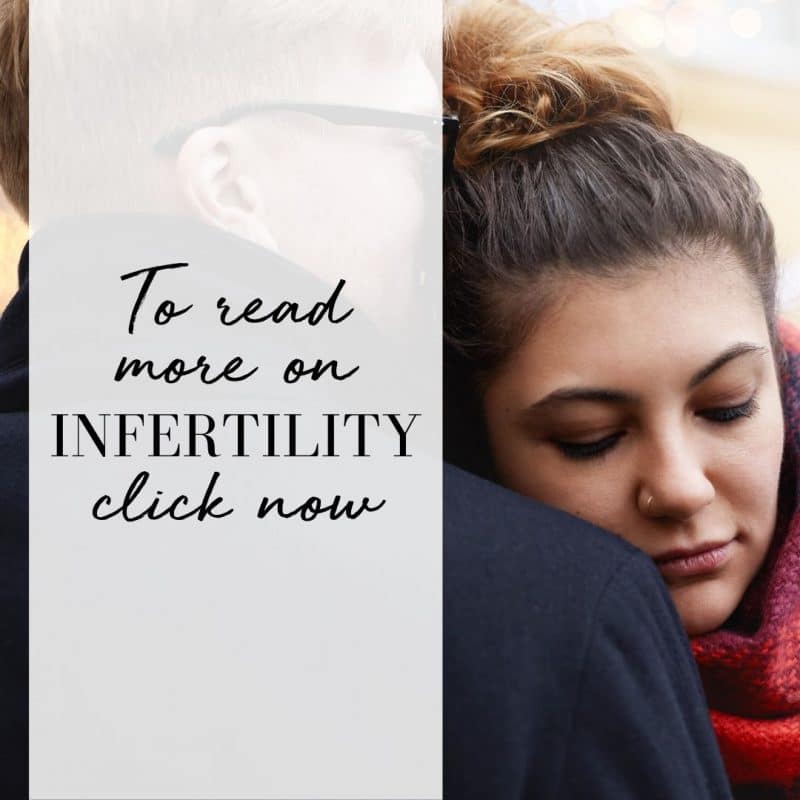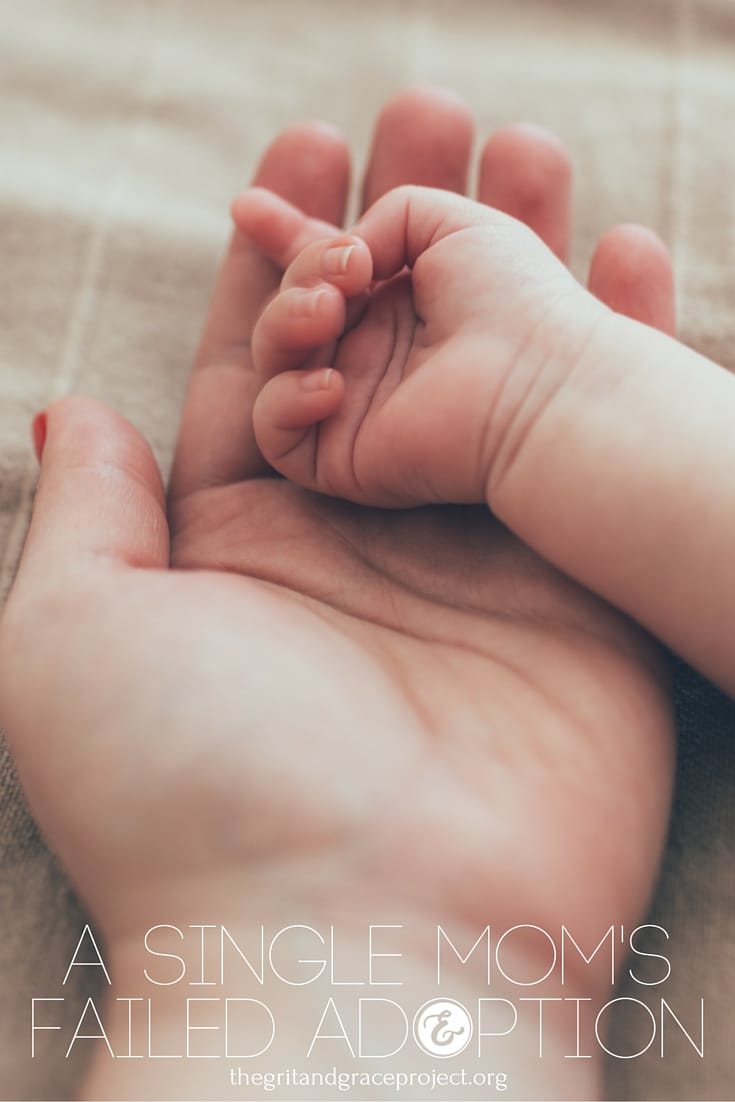I sat on the edge of the exam table, a sheet draped over my lap, exam gown tied in the back. I was waiting for the doctor to enter the room. I needed him to tell me why I couldn’t get pregnant.
It was difficult to understand—there were women all around me that just looked at their husbands and got pregnant. So many stories on the nightly news of babies being found in dumpsters, abandoned in the cold, young women ending their babies’ journeys out of convenience. What was wrong with me?
I wrestled with my emotions and if I am completely honest, I was angry. Mad at myself for failing to be a real woman and mad at God for not answering my prayers. Having a baby was what I was born to do.
My First Loss
It had been several years since the loss of our first baby.
Instead of making her way to my uterus, she found her resting place in my right fallopian tube. Babies don’t grow in fallopian tubes, and, as a result, my tube ruptured. They wheeled me into the surgical suite and when I woke, our baby was gone.
I think of her often. My heart still aches to hold her, to see her precious face, but I was forced to settle. Finding comfort in the knowledge that one day, I will spend eternity with her.
The months and years following that loss, I struggled.
You have to understand—since I was a small child, having a baby was my one dream. It was how I defined myself, my purpose, the source of value. And now, I questioned myself and God.
The door finally opened; the doctor stepped through the entrance and pulled the stool to the end of the exam table where I sat. “Allison, we have your results back. You have endometriosis. We believe it is extensive and is the cause of your infertility.”

I had always had difficult periods. I would climb into bed, curl into a ball, and wait for the pain to pass. Sometimes that was days, on the good months, it was hours.
But infertility, not able to have a baby—no. He had to have the wrong results.
The rest of the visit was filled with words I didn’t understand, a painful exam, and a discussion about an exploratory surgery to determine the extent of the disease. It would determine if reconstruction could help my infertility.
What I heard—there was hope!
The surgery was scheduled.
My World Crashed
On the day of the surgery, my husband and I sat in the waiting room. I had done the research and felt like I had a handle on my endometriosis diagnosis. I was ready, ready to get this fixed and start trying again to get pregnant.
I kissed my husband and they wheeled me away. The next time I saw him, I was in the recovery room. He brushed my forehead and kissed me. There was a sadness in his eyes, the look that says, “I need to tell you something and the news isn’t good.”
It wasn’t long until the surgeon appeared and shared that the surgery had gone well but…
I held my breath, his look and body language mirrored my husband’s—the news was not going to be good.
“Allison, I am so sorry but we had to do a total hysterectomy, including the removal of your fallopian tubes. The endometriosis was everywhere, your organs attached to your pelvic floor, your intestines, and the abdominal wall. Your tubes were badly narrowed and your uterus was a solid mass. There was no possible way for you to successfully carry a baby.”
Wait, this surgery was going to correct the problem. It was going to allow me to get pregnant. How did it end in a hysterectomy? I was confused and the pain and narcotics made the announcement much more difficult to comprehend.
To say I was devastated would be an understatement. My world crashed, my mind raced, and the pain was uncontrollable. My coping mechanism was to push it all away and move forward.
To say I was devastated would be an understatement. I began to doubt God’s love and His plans for my life. He had created me, female, planted this desire deep in my soul to have a baby and then all of it was changed…
It appears that endometriosis is a relentless pursuer. It entangles itself into the nooks and crannies of your body and disrupts your body’s basic functions.
Pelvic pain was a reliable partner, intermittent small bowel obstructions, and years on a liquid diet, but the real pain came from a tape that constantly played in my head. The message reminded me that I was less than, worthless, not a real woman. It drove me to question my husband’s love, his fidelity, and the trajectory of our relationship. I began to doubt God’s love and His plans for my life. He had created me, female, planted this desire deep in my soul to have a baby and then all of it was changed, my dreams, my purpose—all gone.
Our Journey to Adoption
Then hope materialized.
My husband and I heard that our local county adoption agency was looking for adoptive parents. We took it as a sign from God that we were to investigate. So, we called and scheduled an appointment.
During the visit, we completed the necessary paperwork and received information about the background check process. It would be a few weeks until we heard from the agency again but when the phone rang, it changed our world.
It was early December when the call came in. The caller shared that a toddler had become available. She asked if we would be interested in meeting him, and we jumped at the opportunity.
Daniel was three years old. He was a beautiful bi-racial toddler with big brown eyes and a head full of curls. I was in love.
We spent the next few weeks together and before Christmas, Daniel became our son.
I was a mother. No, he was not my biological child but he was our son. My husband and I did our best to prepare our home, our lives, our minds for our new addition—this beautiful child but…
The Harsh Reality Came Out
Daniel had been in our home for several months when we started noticing some concerning behaviors. It was difficult for him to bond with adults. He was a very bright child but he used his intelligence to manipulate situations and people and he was becoming increasingly more defiant, especially with women—primarily with me.
We thought that interaction with other children and a more structured environment might help him, so we found a small preschool. For the first few weeks, all was going well. And then the phone calls began. Daniel was sexually acting out to the other children. He refused to follow his teachers’ directions and spent most of his days in the director’s office, isolated from the other children. Finally, we were asked to remove Daniel from the school. We tried a second school, not wanting to believe what we were experiencing. The first few weeks all was going well and then, just as before, the calls started. We moved Daniel again.
Daniel often spoke about his foster family. It was a big family that included both biological children and a host of foster kids. They ranged in age from infant to teenagers and all had special needs. Some had physical disabilities but most of the children had mental health challenges.
Daniel longed to return to his foster family. When asked why he wanted to return he shared, because “I can do anything I want there.”
Hindsight is always 20:20.
Dealing With Another Heartbreak
Looking back at our adoption process, it was plagued with failure. We became adoptive parents in less than one month. We never attended adoption classes to help us prepare. In fact, our social worker never talked about classes. We had limited information on Daniel’s past and we were completely unprepared to deal with a child with significant emotional problems.
After Daniel’s adoption, we moved to a new city. With the move came a new social worker and greater clarity on our son’s past.
One afternoon, I walked to the mailbox and collected the day’s mail. Walking back to our house, I leafed through the letters and found one that looked official. It was from the adoption agency. I opened the letter and began to read. There was one sentence that grabbed my attention, “If Daniel ever requires institutionalization for his mental illness the State will pay all costs.” I folded the letter, placed it back in the envelope, and choked back tears. What were they talking about—institutionalization, mental illness?
My husband and I read the letter in detail, looked at each other, and simultaneously said, “We need to talk with our social worker.” The call was revealing.
Daniel’s mother was 16 when she gave birth. She was a drug addict that suffered from depression. We learned she physically and sexually abused him for most of his young life and when her life became too complicated, she dropped him off at the agency and walked away, his baby sister in her arms.
Little was known about his father but we did learn that he was an addict with a history of significant mental illness. A diagnosis of bipolar personality disorder and schizophrenia.
The social worker shared that Daniel had been with his foster family for several months. During his time in the home, he was repeatedly sexually abused by the teenage foster boys. He often got lost in the crowd of children that occupied the home and was given free rein—too many other children with greater needs.
Pushing On Through the Challenges
Now the pieces of the picture were becoming clear. The abbreviated adoption process, the fast placement of Daniel in our home, his behavior, and his anger toward women. Our little one had experienced more trauma in his first three years of life than anyone should ever experience. All the adults in his life had failed him, betrayed him—I was starting to understand his anger.

Daniel continued talking about going back to his foster family. It was becoming increasingly clear; he did not see us as mom and dad. His rebellion and acting out increased and then the unthinkable happened.
At the age of five, Daniel ran away. He slipped out of his bed late one night and made his way down the street. A neighbor spotted him and called to let us know he was OK. We rushed to our neighbor’s home and collected our son.
When asked why he tried to leave, he responded, “I want to go home.” My heart broke.
Our social worker recommended that Daniel be removed from our home and placed in a facility that would allow him to get the help needed for the pain he had suffered.
After days of blaming, praying, and crying, we packed our son’s belongings, placed his small hand in the palm of our social worker’s hand, and kissed him goodbye.
Endometriosis, infertility, failed adoption—my plans all washed away.
When God Says No
God said, “No.” A loud resounding “NO.” No to biological babies. No to adopted babies. No to any semblance of a normal life. I was left with an emptiness, an overwhelming sense of failure, a pain that could not be medicated, surgically removed, or talked through. I had stuffed the initial disappointment of not being able to have a child. But now, this new failure had pushed that old pain to the surface.
My husband was supportive, my family and friends encouraging, but I could not get my arms around this crushing feeling of loss and failure.
My job became a safe haven. A place where I could excel. I had purpose. I was a significant contributor. The harder I worked, the greater the accolades. So, I worked—60+ hour weeks. I traveled. I took the promotions. I tried to stuff the emptiness back into my memory.
But then came another surgery to address the damage caused by my disease and I was forced to deal with all the emotions I tried to avoid. The cycle had repeated over the past eight years—12 surgeries in all, until one morning God caught my attention.
It was Sunday morning. I was physically tired and emotionally drained. The multiple surgeries had taken their toll. I forced myself to get dressed and we drove a few miles to church. We found our way to the middle of the church auditorium and I cocooned myself in the seat, hoping to make it through the service unnoticed.
I wore my favorite mask that morning. Attempting to hide the fear and pain that enveloped my world. I didn’t want anyone to see the real me, ask questions, or try to fix me. I knew if anyone started poking around, I would burst, and I probably wouldn’t be able to stop the tears. Being a successful, look-good Christian was my sanctuary, my security.

The pastor’s sermon opened by sharing that as humans we strive to have our agendas fulfilled, often seeing Jesus as our personal genie. We tell Him our wants and we expect Him to respond immediately—our timing, our desires, our plans.
He went on to share that true value and real purpose were found in a relationship with Jesus, not in getting our wants met. Living outside of this relationship and continuing to see Him as a genie only brings emptiness and despair.
Jesus did not die so our dreams would be fulfilled. He died to give us new dreams. Jesus’ resurrection did not confirm our plans would be realized. Jesus rose to bring real life, eternal life.
“This means that anyone who belongs to Christ has become a new person. The old life is gone; a new life has begun!” (2 Corinthians 5:17).
Then God Broke Through
And it hit me!
I had shoved Jesus into a bottle and placed the bottle in a small cage.
I wanted to have a baby, I wanted to adopt, I wanted a successful marriage, a beautiful home, a meaningful career—all genie-in-the-bottle thinking.
I had also placed significant limitations on how I wanted Jesus to respond—a cage around our relationship. The bars were held tightly together by my feelings of inadequacy, my fears of failure, and the lingering pain from poor decisions, buried sin, and my physical body’s brokenness. The cage was secure and I had lost the key years before.
During that service, Jesus revealed His love for me. The pastor’s words had penetrated my cocoon and it forced me to acknowledge I am not the center of the universe. I had become controlling and self-absorbed, but…
Jesus offered a key that morning. It unlocked the cage I had built around Him and around my life. He offered freedom.
I walked away from the auditorium leaving behind all that had enslaved me. I recommitted to trusting Him. Trusting Him to give me a new purpose and to restore true value.
I left my mask lying on the chair. I would no longer need to try to hide from God or those who loved me. I was free.
Leaning Into My Freedom
The physical pain remains and tears still flow when I encounter the beauty of a new life or the pain of a little one lost. But today I recognize all my experiences, all the disappointments, all the tears were not in vain. Each had meaning, each led to God’s transformative work in my life.
Hindsight is always 20:20. Looking back at our adoption process, it was plagued with failure. Endometriosis, infertility, failed adoption—my plans all washed away.
Left unchecked, I would have continued in my selfishness, but now my heart longs to be used for God’s glory. I am learning it’s not about what I do, what I have, or my ability to control. It is all about who I belong to and allowing God to work in me and through me.
God said “yes” that morning. Yes, to a new beginning.
Regardless of our circumstances, God uses our humanness to transform us. Then he uses our transformation to serve others.
If you are struggling with doubt about God’s goodness or waiting for Him to answer your wants or to fulfill your desires, I encourage you to refocus on your relationship with Him. He loves you and He is the source of satisfaction, real value, a meaningful life, and true purpose.
Praying For Daniel
Several months after Daniel left our home, we learned that he had been returned to the foster care system. All the discussions of how he needed very specific mental health intervention had been thrown out the window. We inquired why they hadn’t followed their initial treatment plan and they responded, “There was no space.”
I think of Daniel often, I pray for him frequently, but unfortunately, we’ve never received any follow-up information on him. I do know that one day I will know his outcome, until that time I wait.
Today, our adoption experience would never happen. Agencies know that successful adoptions require time, counseling, and support. If you are in the midst of adoption or considering adoption, please don’t let our experience scare you. I share our story to encourage you. Take your time, ask questions, attend counseling sessions, take classes, and talk with adoptive parents. And once you’ve done your homework and sought God’s wisdom, be prepared to be blessed beyond measure, challenged daily, and changed completely.
—
For more encouragement through infertility, we recommend this podcast episode: How to Handle Real-Life Struggles That Challenge Your Faith – 112














